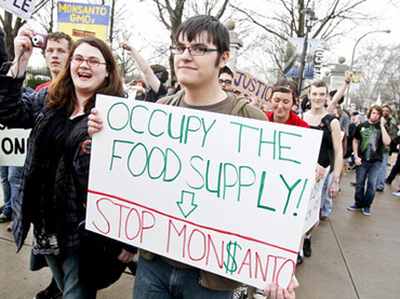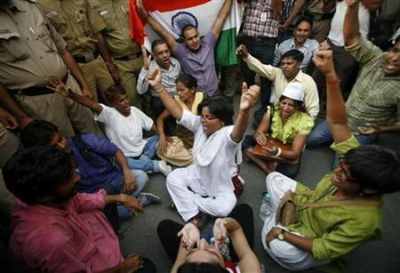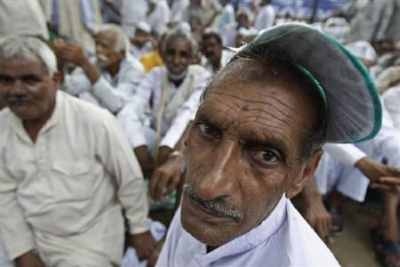Photographs: Sarah Conard/Reuters Rajni Bakshi
After a blaze of activity and global media attention the various "Occupy" protests seem to have faded from public attention. Critics had all along dismissed the protests as a momentary venting of anger that would go nowhere. But were the passionate protests, which reverberated across the world, just a flash in the pan, finds out Rajni Bakshi.
As a grand spectacle, of the kind that grabs headline news, 'Occupy' has indeed gone into the background – even though the 'occupation' of Wall street continues at Union Square a few blocks uptown.
What is more significant is that the spirit of defiance and the determination to take on powerful interests is thriving on the ground in many forms.
Agriculture, the dispute over Genetically Modified (GM) crops and the fate of farmers across the world is one of the key areas in which unrest is mounting. One signal of this at the global level is the call to "Occupy Monsanto". In India the struggle of Kisan Swaraj continues to intensify with another public hearing being held last week in Bhubaneshwar.
Union Budget 2012-13: Complete coverage...
Occupy protests: Are they more than a trend?
Photographs: Sarah Conard/Reuters
A globally dispersed network of activists has given the call for "Occupy Monsanto". An agriculture biotechnology multi-national, Monsanto is the world's leading manufacturer of herbicides and genetically modified seeds.
"Whether you like it or not, chances are Monsanto contaminated the food you ate today with chemicals and GMOs" says the Occupy Monsanto website. It goes on to allege that "Monsanto controls much of the world's food supply at the expense of food democracy worldwide." Therefore a global mass action is being planned on September 17th 2012 "to empower citizens of the world to take action against Monsanto".
This call to action asks people to identify a Monsanto facility in their vicinity and plan chants, slogans, speeches or other actions that will expresses outrage over the "devastation of our food, health, and environment, and many considerations."
Union Budget 2012-13: Complete coverage...
Occupy protests: Are they more than a trend?
Photographs: Sarah Conard/Reuters
Interestingly, "Occupy-Monsanto" is a dot com website. Perhaps it is supported by the growing organic food industry.
In January there was an "Occupy" encampment near Monsanto's offices in Maui, the second largest of the Hawaian islands. Monsanto's officials were reported to have said that while they respect everyone's freedom of expression they claimed that such protests are based on misleading and factually incorrect statements about Monsanto and genetically engineered crops.
But the political battle over our food future should not be gauged from such public actions alone. In India protests at the facilities of Monsanto and Cargill, the other major agro-industrial company, inevitably focus on what people don't want. It is far more important to observe what activist groups are doing outside the public gaze.
Union Budget 2012-13: Complete coverage...
Occupy protests: Are they more than a trend?
Photographs: Ajay Verma/Reuters
For instance, on March 15th this year activist groups organised a public hearing before a Farmers' Jury at Bhubaneswar. Its verdict took the form, not of condemnation, but an articulation of aspirations – namely, debt-free, poison-free, integrated, self-reliant, empowering agriculture.
"We dream of building a Naya Aasmaan (a New Sky), Nayee Dharti (New Earth) and Nayaa Bhaarat (New India)" said a statement issued by the 'Jury'.
At the core of this vision are the interests of adivasis, women, smallholder farmers and ecological farmers. One of their key demands is a decentralised, participatory planning process.
Occupy protests: Are they more than a trend?
Photographs: Parivartan Sharma/Reuters
"We do not want any Punjab in our states, where there might be an initial phase of growth but will soon end in health, environmental and economic disaster" said the statement. Nor do such farmers want any handouts from government.
"We seek Seed Independence, with access to and availability of diverse kinds of seeds. We believe that this focus on rice and wheat is inappropriate and adequate attention has to be paid to other crops like millets, pulses, oilseeds, vegetables etc. Only then can there be true food security."
Eastern India is now the key battle ground since there are plans to adopt a Green Revolution approach there. According to votaries of Kisan Swaraj, whose work has been reported earlier in this column, there is need for a comprehensive evaluation to assess the benefits and harmful impacts of the earlier Green Revolution.
Union Budget 2012-13: Complete coverage...
Occupy protests: Are they more than a trend?
Photographs: Adnan Abidi/Reuters
This would include examining the connection between chemical intensive agriculture and rampant indebtedness and suicides of farmers across India.
Such activists are also asking the government to answer a rather basic question. Why is there so much emphasis on equating increased food production with food security when millions continue to starve in India despite record harvests.
While Indian groups joining protests like Occupy Monsanto will invariably get more coverage it is their core demands that require closer attention:
Agricultural operations should be recognized as skilled work and all pricing and other policies should be based on such a change.
Bureaucratic hassles relating to land titles must be removed.
The National Rural Employment Guarantee Act (NREGA) should be utilized for making bio-fertilisers and bio-pesticides.
Promote conservation of traditional seed varieties and focus on crops other than rice and wheat, such as pulses, oilseeds, vegetables and millets.
Occupy protests: Are they more than a trend?
Photographs: Max Whittaker/Reuters
Setting up of seed banks in all villages, controlled and managed by women's Self-Help Groups (SHG). Rejection of hybrid seeds since they require more inputs to perform and intellectual property rights regimes take them out of the control of the farmer.
Subsidy on chemical fertilizers should be phased out in a time-bound fashion and those resources should be diverted for investments for expanding organic farming.
The government should ensure fair and remunerative prices for farmers. Haath bazaars should be improved with all facilities including short-term storage. Investments should be made on storage facilities for produce at the village level.
The members of this Jurycame from various states – Jharkhand, West Bengal, Assam, Eastern Uttar Pradesh, Chattisgarh, Bihar and Odisha. Most of them are farmers with small holdings of two to ten acres. Global 'Occupy' events are significant as energy centers for dissent. But it is in such persistent work at the ground that the answers and solutions are being sought.








article